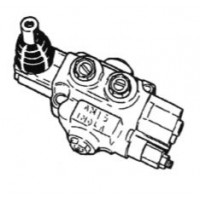
Hydraulic valves control the directional flow of fluids through a hydraulic system. Choosing the right type of valve is highly important for the system’s overall function. From solenoid to multi-block directional valves and from directional to pressure control valves, it’s not always easy to figure out which valve is the best for you.

Ideally, you should get a professional opinion about the best type of valve for your system. Another thing to consider when choosing a valve is whether it’s manually operated or automatic. While automating the system may be the preferred option for some applications, the importance of manually operated hand valves should not be underestimated.
Let’s look deeper at the advantages of these hand valves for your hydraulic system.
1) Backup
One of the biggest advantages of manually operated hand valves is their ability to work when the rest of the system doesn’t. The downside of automating a system is the inability to interfere with the process if something goes wrong.
Having a manually operated hand valve as a backup option allows the operator to work with the system in case of an emergency, especially when it’s necessary to switch the direction of the fluid quickly.
2) Simplicity
Another advantage of manually operated hand valves is their simplicity. More often than not, a basic hydraulic system doesn’t need sophisticated components. In fact, installing a fancy valve in a simple system can hinder its productivity.
3) Cost
Manually operated hand valves are usually less expensive than other options. The simplicity of their design makes them cheaper to manufacture. The same factor determines their longevity. The simpler the valve’s design is, the longer it will last since it doesn’t have any complex components, which run the risk of breaking down.
4) Versatility
When you opt for a manual valve, you always leave yourself the option of automating it in the future. If for some reason you need to automate the process, it’s possible to turn a manual valve into an electric valve without incurring high replacement costs. The reverse is not true. An electric valve cannot usually be adapted for manual use.
5) Speed
While it may seem counterintuitive, manual valves are frequently quicker than their electric counterparts. You can change the direction of the fluid flow faster if you operate the valve by hand rather than wait for the electric component to complete the process.
As with all hydraulic components, whether they are electric or manual, not all hand valves are made with the same functions and quality. It’s vital for system designers to have all the necessary information about the system to determine the required characteristics of the manual valves. Such characteristics are:
- Flow configuration
- Flow and pressure rating
- Fluid compatibility
- Contamination sensitivity
- Mounting options
- Environmental suitability
While having a system with a manually operated hand valve is advantageous in some circumstances, these valves aren’t suitable for all projects. Please consult an expert to find out whether such a valve is an option for your system.
At Ranger Caradoc, we stock a large range of superior quality valves of all types. For more information, please download our free e-book; The OEM Guide to Hydraulic Systems.







